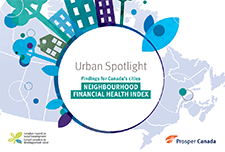Discover financial empowerment resources
Discover financial empowerment resources
Canada faces a decline in financial well-being. This report identifies systemic barriers to financial well-being and proposes a series of targeted institutional reforms, including the following: • Accelerate open banking • Streamline rules for inclusive innovators • Create a community...
Prosper Canada's comprehensive report, Closing the Divide: Solutions for Canada's Financial Help Gap, sets out clear steps governments, financial services, and community organizations can take to ensure every Canadian – no matter who they are or where they live – can access the financial help...
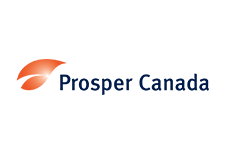
Canadians with low incomes lack access to the financial help they need to rebuild their financial health and resilience. Watch the webinar from September 17, 2025 as we present findings from our recent report: Closing the Divide: Solutions for Canada’s Financial Help Gap. Prosper Canada’s...
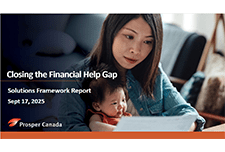
Tables for 14 indicators in Canada's Quality of Life Framework have been updated to include Canadian Social Survey data collected from October to December 2024 (fourth quarter of 2024). These indicators include life satisfaction, sense of meaning and purpose, future outlook, loneliness,...

From 2019 to 2022, among Indigenous people aged 18 years and older, 54.3% of Inuit reported having a regular healthcare provider, along with 81.4% of First Nations people living off reserve and 84.5% of Métis. This is compared with 85.7% of the non-Indigenous adult population. Released...

This article analyses results from the Canadian Housing Survey, 2022 , using new variables on homelessness and factors contributing to regaining and maintaining housing. The paper provides a descriptive overview of different types of homelessness experiences in Canada, highlighting select...

Financial coaching (FC) is a transformative approach that empowers individuals to take control of their financial future. Through personalized interventions such as assessing financial positions, creating budgets, managing credit, accessing benefits, and filing taxes, financial coaching equips...

The Monthly Financial Well-being Monitor is a survey designed to collect information about Canadians' day-to-day financial management and financial well-being. It collects data from approximately 1,000 respondents per month and is a continuation of the COVID-19 Financial Well-being Survey, which...

The Financial Consumer Agency of Canada’s (FCAC) report examines and compares key measures of financial well-being for 3 groups of Canadians: homeowners with mortgages, homeowners without mortgages, and renters. The data shown here are derived from FCAC’s COVID-19 Financial Well-being Survey....

Savings are one of the strongest predictors of household financial resilience and well-being, yet Canadian households struggle to save due to an array of economic, behavioural and institutional factors. The Financial Consumer Agency of Canada (FCAC) created the National Financial Literacy...

Gender-based violence (GBV) is one of the most prevalent human rights issues in the world. Worldwide, an estimated one in three women will experience physical or sexual abuse in her lifetime. GBV is a multifaceted issue that undermines the health, dignity, security and autonomy of women and has a...

November 26 is National Economic Abuse Awareness day. The Canadian Centre for Women's Empowerment has published their report on the state of economic abuse in Canada; championing financially strong futures for survivors. Here are some additional resources of potential interest: The economic...
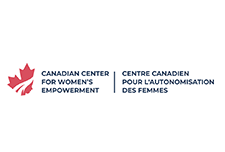
Recent increases in the cost of living and declining real estate values had unprecedented impacts on net saving and wealth for more financially vulnerable households in the first quarter, such as those with lower incomes, less wealth, and in younger age groups. Statistics Canada has gathered data...

A prolonged period of rising inflation and interest rates has led to another significant downturn in the financial wellbeing of adult Canadians, risking their retirement readiness and security, according to the 2023 Canadian Retirement Survey from Healthcare of Ontario Pension Plan (HOOPP) and...

There are many effective, award-winning financial literacy programs in Canada. However, many of these programs do not meet the needs of women living on low incomes. Families Canada’s national research study identified 14 social, economic, and institutional barriers that prevent women living on...
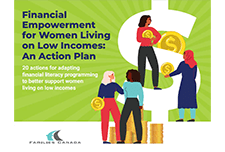
In 2022, the Consumer Price Index rose 6.8%, the highest increase since 1982 (+10.9%). Prices for day-to-day goods and services such as transportation (+10.6%), food (+8.9%) and shelter (+6.9%) rose the most. Canadians felt the impact of rising prices. Data from the Canadian Social Survey...

This study uses the 2022 Portrait of Canadian Society Survey to examine the impact of rising inflation on the lowest income Canadians. Using multiple pre-pandemic data sources, the study takes a closer look at people living in the bottom family income quintile, examining their family income, debt...
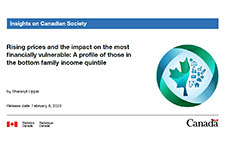
This collection of financial empowerment tools and resources is intended to support both Indigenous and non-Indigenous organizations working to build financial wellness in First Nation communities. It was created as part of the Financial Wellness in First Nations project (2021-2023) where...
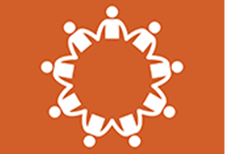
The ballooning cost of living has had a disproportionate impact on low-income households, 77.6% of whom are financially vulnerable or extremely financially vulnerable. Prosper Canada's recently commissioned study from the Financial Resilience Institute, shows the unarguable deteriorating state of...

This report is about the financial resilience and financial well-being of Canadians with low incomes based on the Seymour Financial Resilience Index ® It provides a call to action for more targeted support from policymakers, financial institutions and community non profit organizations for...
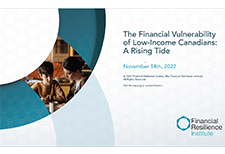
Daily aspects of Canadians' lives are increasingly touched by digital technology, and access to high-speed Internet has become an essential service and a key driver for improving our economic and social well-being. The Government of Canada originally announced Connecting Families in Budget 2017 to...

How we define financial vulnerability ultimately determines what supports are created and for whom. Is the current definition aimed at helping everyone who needs it? This webinar explores the conception and redefining of financial vulnerability in Canada based on the research and findings from the...
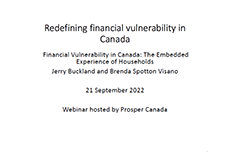
Financial empowerment (FE) is an approach to poverty reduction that focuses on improving the financial security of people living on low income. Evidence shows that embedding FE interventions into municipal welfare, employment, housing, shelter and health services can significantly boost service...

Canada ranks consistently as one of the best places to live in the world and one of the wealthiest. When it comes to looking at the financial health of Canadian households, however, we are often forced to rely on incomplete measures, like income alone, or aggregate national statistics that tell...
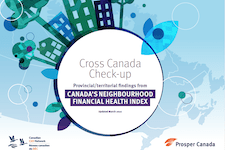
This report examines the financial health and vulnerability of households in Canada’s 35 largest cities, using a new composite index of household financial health at the neighbourhood level, the Neighbourhood Financial Health Index or NFHI. The NFHI is designed to shine a light on the dynamics...
